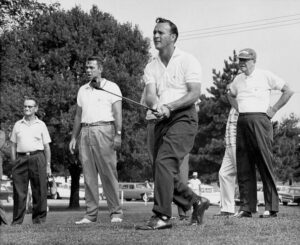Arnold Palmer’s Net Worth: The Legacy of a Golf Icon
 Credit- Sportskeeda. Com
Credit- Sportskeeda. Com
Arnold Palmer, fondly remembered as “The King” of golf, wasn’t just a trailblazer in the sport. His influence reached beyond the fairways and into the realms of business, endorsements, and philanthropy, amassing significant wealth over his lifetime. As one of the greatest golfers of all time, Palmer’s net worth at the time of his passing in 2016 was estimated to be around $875 million. His financial success was a culmination of not only his impressive career in golf but also his ventures outside the sport.
Early Life and Golfing Career
Born on September 10, 1929, in Latrobe, Pennsylvania, Palmer grew up on a golf course, where his father worked as a greenskeeper and later as a professional. This early exposure to the game laid the foundation for his future success. Palmer’s professional career began in 1954 when he won the U.S. Amateur Championship, setting him on a path to greatness.
Palmer’s charisma, combined with his aggressive playing style, made him a fan favorite. He won 62 PGA Tour titles, including seven major championships. Between 1958 and 1964, he was virtually unbeatable, winning four Masters tournaments, two British Opens, and a U.S. Open title. These achievements not only secured his place in the pantheon of golf legends but also helped him build his financial empire.
Business Ventures and Endorsements
Arnold Palmer was one of the first athletes to capitalize on his image and brand. His partnership with sports agent Mark McCormack in the early 1960s revolutionized sports marketing. McCormack, the founder of IMG (International Management Group), recognized Palmer’s appeal to everyday fans, which extended beyond the affluent, country club audiences of golf. This partnership led to lucrative endorsements and business opportunities.
Palmer endorsed a wide range of products, from motor oil and tractors to soft drinks and apparel. Perhaps one of his most famous brand associations was with the iced tea and lemonade drink that bears his name, the “Arnold Palmer.” This drink, a blend of iced tea and lemonade, became so popular that it evolved into a successful beverage line in its own right, contributing to Palmer’s growing wealth.
Additionally, Palmer invested in various businesses. He was a co-founder of Golf Channel, which became a major success and contributed significantly to his net worth. His involvement in golf course design further enhanced his income, with over 300 courses worldwide bearing his signature design. Palmer was also a pilot, and his love for aviation led him to invest in the aviation industry, adding another revenue stream to his portfolio.
Real Estate and Philanthropy
Arnold Palmer’s real estate ventures were also a significant part of his wealth-building strategy. He was instrumental in developing the Bay Hill Club & Lodge in Orlando, Florida, which hosts the Arnold Palmer Invitational, one of the most prestigious events on the PGA Tour. The success of Bay Hill contributed both to Palmer’s income and his legacy in the golfing world.
Beyond his financial success, Palmer was known for his philanthropy. He was deeply involved in charitable work, particularly through the Arnold Palmer Hospital for Children in Orlando. His contributions to healthcare, education, and children’s welfare solidified his reputation as not only a golfing legend but also a humanitarian.
Legacy and Financial Impact
At the time of his death in 2016, Arnold Palmer’s net worth was estimated to be around $875 million, making him one of the wealthiest athletes in the world. His earnings continued to grow posthumously, as his brand and likeness remained marketable. In 2020, Palmer ranked as one of the highest-earning deceased celebrities, thanks to ongoing endorsement deals and business ventures associated with his name.
Palmer’s financial success laid the groundwork for future generations of athletes to capitalize on their fame. He showed that athletes could build empires through endorsements, investments, and business ventures. His legacy in this area is almost as significant as his impact on the game of golf itself.
Conclusion
Arnold Palmer’s wealth wasn’t just the result of his success on the golf course; it was a product of his business acumen, marketability, and generosity. His net worth of $875 million is a testament to his ability to blend athletic prowess with entrepreneurship. More than just a golfer, Palmer was a brand, a philanthropist, and a pioneer who transformed the way athletes engage with the business world. His legacy continues to influence not just the sport of golf, but the world of sports marketing and endorsements at large.